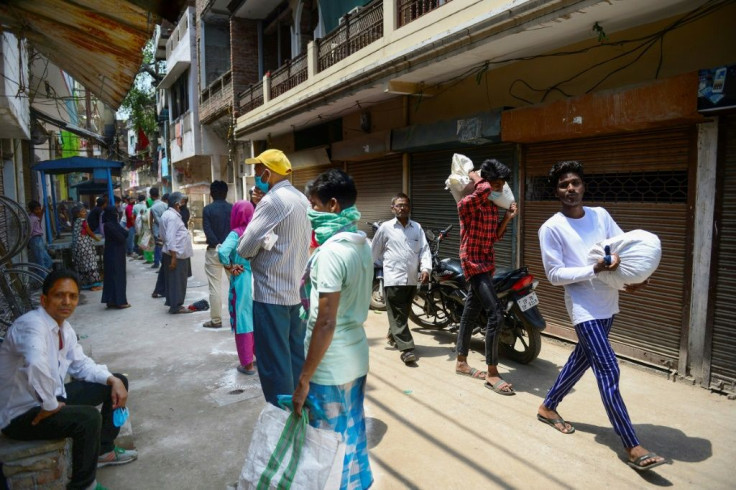India Allows Rural Poor To Work In Virus Lockdown
Millions of people in rural India will be allowed back to work next week despite a nationwide coronavirus lockdown, the government said Wednesday, as it conceded the hardships of shutting its vital farming economy were too great.
Restrictions on movement in the world's second-most populous nation of 1.3 billion people -- put in place in late March -- have hit the poorest the hardest, including rural migrant workers and other labourers.
In cities and towns, usually bustling streets are deserted and shops shuttered, while jobless migrants who did not manage to make the long journey home to villages, often on foot, are living in crowded shelters in cities.
The lockdown has also taken place during the harvest season, with farmers worried their reaping and sowing cycles will be severely disrupted and place further pressure on India's food supply chain -- already hit by transport delays.
"To mitigate hardship to the public, select additional activities will be allowed," the Home Affairs Ministry said.
"The revised consolidated guidelines are aimed at operating those sectors of the economy which are critical from the perspective of rural and agricultural development."
Under the new guidelines to be implemented from April 20, agriculture and related sectors including farmers' markets, logistics, repair shops and brick kilns will be restarted.
Strict measures will be enforced, including the wearing of face masks or coverings.
Some factories such as manufacturing will also be re-opened but staffing will be limited and working hours staggered.
Factory owners are required to try and provide dormitories for workers or arrange special transport to and from the plants.
Refineries, coal production and some construction will also be permitted.
The rural and industry sectors make up about 40 percent of India's GDP. Some 70 percent of India's workforce lives in rural regions.

Many fear India's lockdown has pushed millions of workers, particularly in the informal economy, deeper into poverty.
The northern Uttar Pradesh and Punjab states, home to a combined 250 million people and which have heavily agrarian economies, welcomed the new guidelines and said they would ease the pressure on farmers and other agricultural workers.
Rural migrants to cities have been hard hit, with many losing their jobs amid the lockdown.
Those that were unable to return to their villages with state borders closed and inter-state rail and bus services halted have been housed and fed by state authorities in makeshift camps.
But tensions have been boiling over in recent days, with hundreds of migrants in western Gujarat state's Surat city and in Mumbai taking to the streets to demand to be allowed to go home.
Some also complained they were not given enough food to eat.
At a wholesale market in the capital New Delhi, vegetable seller Waseem Ahmed, who is 28 and supports a family of 10, said he did not know where or when his next meal would come from.
"There are no buyers and I'm selling very little," Ahmed told AFP Wednesday, adding that he couldn't even leave the wholesale market as local police were beating anyone seen outside during the lockdown.
The head of the local workers' union, Mohammed Umar, said the market was receiving very few vegetables.
"Even in that supply, only half of it gets sold. Customers are not coming because they are afraid of the police," Umar told AFP.
India has reported just over 11,900 coronavirus cases including 392 deaths. But experts warn that more testing needs to be done to gauge how widely the infectious disease has spread.
There are concerns that weaker public health care systems in South Asian nations will be unable to cope with a major outbreak.
© Copyright AFP 2024. All rights reserved.





















